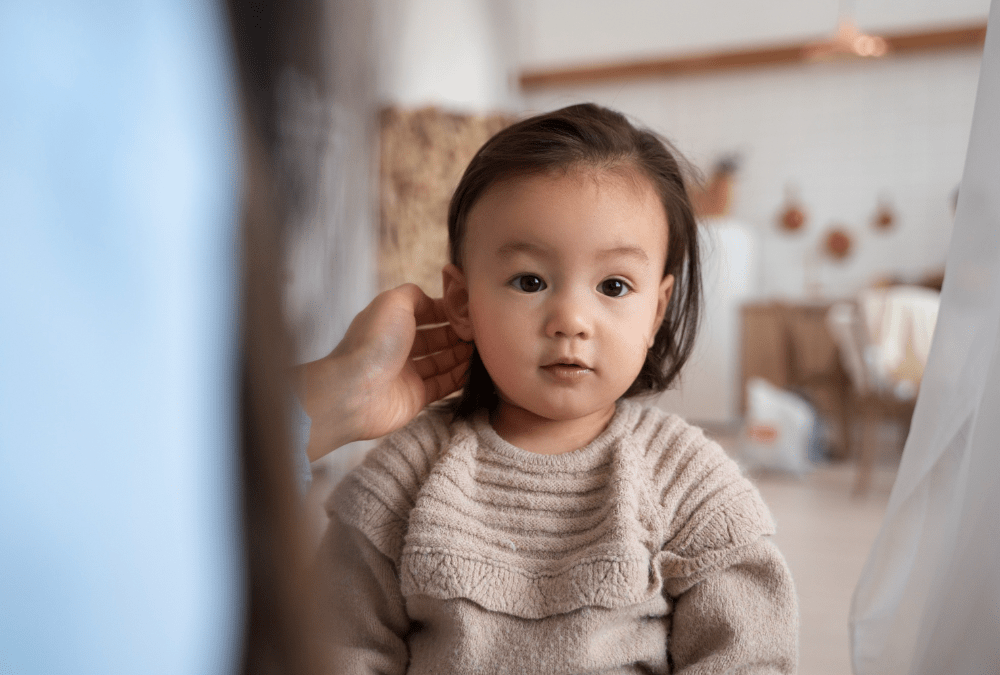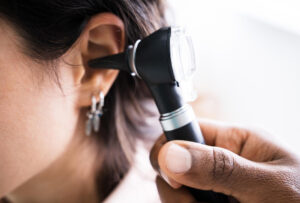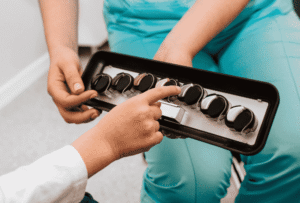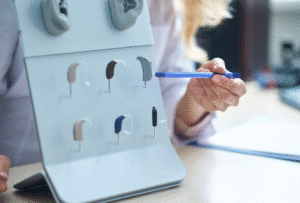Hearing loss in children can profoundly affect their ability to learn, communicate, and connect with the world around them. Understanding the causes and spotting the early signs are key to providing the support these little ones need to thrive.
In this guide, we’ll explore the four common causes, signs, and available treatments for pediatric hearing loss, helping you better understand and navigate these challenges.
Signs of Hearing Loss in Infants and Kids
Early detection of hearing loss is vital for effective intervention. Here are some signs that parents and caregivers should be aware of:
- Unresponsive to Loud Sounds: If a child doesn’t turn their head or show any sign of recognition when exposed to a loud sound, it may indicate hearing issues.
- Delayed Speech Development: Children with hearing impairments may start speaking later than their peers or have unclear speech.
- Increasing Volume on Devices: If your child often turns up the volume on TVs or other devices higher than what others find comfortable, it might be a sign of hearing difficulty.
What Causes a Child to Have Hearing Loss?
Congenital deafness is a type of hearing loss that is present at birth, resulting from a combination of genetic and environmental factors that can influence a child’s auditory health even before birth. In contrast, acquired hearing loss occurs after birth and can be caused by various factors such as infections, and trauma. Here are some key factors that cause a child to have hearing loss:
1. Hereditary Conditions
Many cases of congenital deafness are linked to hereditary conditions, which are often the most likely cause of a child’s hearing loss. Autosomal dominant hearing loss can be passed down even if only one parent carries the gene, while autosomal recessive hearing loss occurs when both parents carry a recessive gene. Familiarizing yourself with your family’s genetic history can provide crucial insights for managing this condition.
2. Genetic Disorders
Some genetic disorders frequently associated with childhood hearing loss include Usher syndrome, which affects both hearing and vision; Treacher Collins syndrome, which impacts facial bone development and can affect the ears; and Down syndrome, commonly linked with various degrees of hearing loss due to anatomical and physiological changes in the auditory system. Early identification of these disorders allows for a comprehensive approach to management, addressing both the causes and symptoms of hearing issues and other related health complications.
3. Birth Complications
Infections during pregnancy, such as herpes, rubella, and cytomegalovirus, are significant causes of congenital deafness. These viral infections can cause serious harm to the developing auditory system in a fetus, leading to damage to the inner ear or auditory nerve. Ensuring robust prenatal care and comprehensive health screenings during pregnancy are critical in preventing these infections and protecting the hearing health of the newborn.
4. Injuries or Physical Trauma
Physical trauma during or shortly after birth, such as concussions, skull fractures, or perforated eardrums, can significantly impact a newborn’s hearing capabilities, potentially leading to temporary or permanent hearing loss. These types of injuries, which are among the most common causes of hearing loss in early childhood, can disrupt the normal functioning of the ear’s delicate structures, impairing the transmission of sound signals to the brain. To safeguard newborns from such risks, it’s crucial to handle them with care, ensure a safe birthing environment, and monitor closely for any signs of physical trauma.
Management for Childhood Hearing Loss

Various ways of management are available that can help mitigate the effects of hearing loss and improve communication abilities in affected children. Identifying the signs of hearing problems early is crucial as it allows for timely intervention, which can significantly enhance the effectiveness of these treatments. These options include:
Hearing Aids
Hearing aids are frequently the initial treatment option for pediatric hearing loss, particularly for children with mild to profound levels of hearing impairment. These devices are meticulously calibrated to align with the unique hearing loss profile of each child, effectively amplifying sounds to enhance speech clarity and the perception of other ambient noises. This adjustment allows children to better interact with their environment and communicate more effectively.
With through hearing aid fitting procedures as well as the availability of advanced hearing aids in the Philippines, parents can access high-quality devices equipped with the latest technology. These modern hearing aids offer various features that can be customized to fit the lifestyle and specific auditory requirements of children, thereby significantly improving their ability to hear and engage with the world around them.
Cochlear Implants
For children with severe to profound hearing loss where hearing aids are insufficient, cochlear implants may be recommended. These sophisticated devices bypass the damaged parts of the ear and directly stimulate the auditory nerve, enabling the child to perceive and process sounds. The implantation process involves a surgical procedure followed by extensive auditory rehabilitation to maximize the benefits of the device.
Speech Therapy
Speech therapy is crucial for children with hearing loss, helping them develop language skills that are essential for effective communication. Tailored to each child’s specific needs, this therapy may involve teaching lip reading, using sign language, and employing other communication strategies to enhance verbal and non-verbal interaction.
Speech therapy often works hand-in-hand with the child’s hearing solutions, whether they’re hearing aids or cochlear implants, to ensure comprehensive development in language acquisition and daily communication skills. Regular sessions with a speech therapist can significantly aid in overcoming the challenges posed by hearing loss and help in building confidence in social settings.
Empowering Every Child: The Path to Auditory Wellness and Beyond
Understanding the causes and recognizing the early signs of hearing loss in children are critical steps toward effective management and treatment. Initiating this process with a pediatric hearing evaluation in the Philippines can set a strong foundation for addressing any auditory issues right from the start.
With the right interventions, children with hearing loss can significantly enhance their communication abilities and overall quality of life. Early and proactive management not only helps these children reach their full potential but also enables them to connect more deeply with the world around them. Ensuring that every child receives timely and appropriate care, including regular hearing assessments, is essential for fostering their development and integration into the hearing world. Let’s give every child the chance to hear their world clearly, ensuring they don’t just grow, but thrive with the love and sounds that shape our lives.









